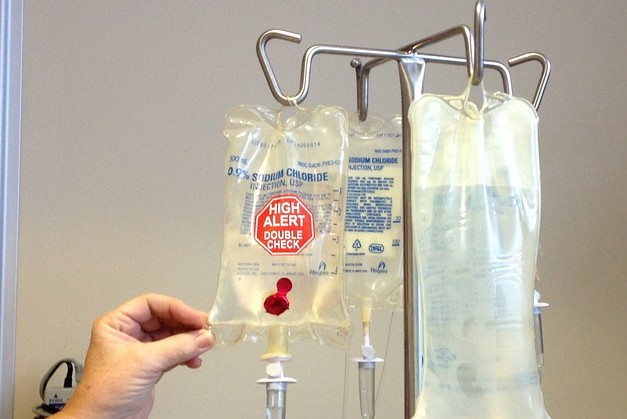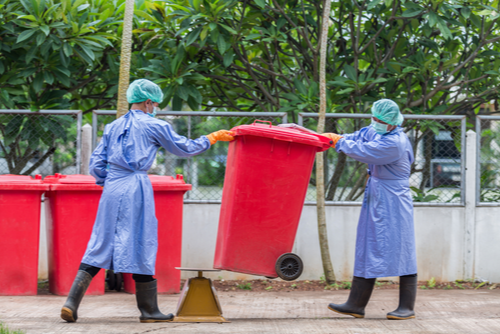Medical Waste Removal Quality: Elevating Safety And Security Requirements in Your Center
Medical Waste Removal Quality: Elevating Safety And Security Requirements in Your Center
Blog Article
Remain Ahead of Rules: Expert Guidance on Medical Garbage Disposal
In a world where the medical care market is continuously evolving, it is essential for clinical facilities to stay ahead of policies when it comes to the proper disposal of clinical waste. From comprehending the different classifications of clinical waste to carrying out the right collection and partition techniques, this conversation will offer valuable understandings and actionable ideas to help centers stay in advance of guidelines in the ever-changing landscape of medical waste disposal.
Recognizing Medical Waste Categories
Comprehending medical waste classifications is vital for proper disposal and management in healthcare facilities. Clinical waste refers to any kind of waste generated by health care activities that might posture a risk to public wellness or the environment. It is critical to categorize clinical waste properly to ensure its risk-free handling, therapy, transportation, and disposal.
There are several categories of clinical waste that medical care facilities need to be aware of. One of the most usual groups consist of contagious waste, pathological waste, sharps waste, pharmaceutical waste, and chemical waste. Each group has details guidelines and policies for its appropriate monitoring and disposal.
Pathological waste refers to human tissues, organs, or body components that call for special handling and disposal. Drug waste consists of ended, unused, or contaminated medicines that need careful handling and disposal.
Staying Up-To-Date With Regulatory Adjustments
Remaining present with regulative modifications is critical for medical care facilities to guarantee compliance and proper monitoring of clinical waste disposal. medical waste removal. With laws frequently progressing, it is vital for health care centers to remain up-to-date to prevent fines, fines, and possible damage to the environment and public health and wellness
To stay in advance of governing adjustments, health care facilities must establish a system for surveillance and tracking updates. This can be done by subscribing to governing e-newsletters, participating in meetings and workshops, and proactively taking part in sector organizations. Furthermore, facilities must designate a personnel member or group in charge of remaining informed and distributing information to pertinent stakeholders.
Routine interaction with regulatory companies is additionally essential. Healthcare facilities need to establish connections with neighborhood, state, and federal agencies to guarantee they understand any type of modifications in regulations that may influence their waste management practices. This can be done with normal meetings, involvement in public remark periods, and aggressive engagement with regulative firms.
Additionally, health care centers must consider partnering with waste administration companies that focus on clinical waste disposal (medical waste disposal services with WasteX). These firms are often skilled in the newest regulations and can provide assistance and support to make sure conformity
Carrying Out Correct Collection and Partition Approaches
To effectively manage medical garbage disposal, medical care centers must establish proper collection and partition methods in accordance with regulative guidelines. Implementing these methods ensures the safe handling and disposal of possibly hazardous materials, protects the setting, and decreases the threat of injuries and infections to healthcare employees and the public.
Correct collection and segregation methods entail making use of assigned containers and labeling systems. Healthcare centers must supply plainly classified containers for various types of medical waste, such as sharps, transmittable waste, pharmaceutical waste, and non-hazardous waste. These containers must be color-coded and clearly significant to stay clear of confusion and promote very easy identification.
Additionally, healthcare facilities must train their team on the right procedures for gathering and segregating clinical waste. This includes educating them medical waste disposal services with WasteX on the various sorts of waste, the appropriate containers to make use of, and the relevance of complying with regulations and standards. Normal training sessions and refresher training courses must be conducted to make sure that staff participants stay current on ideal techniques.
In addition, health care centers ought to develop a system for normal collection and disposal of clinical waste. This might include partnering with qualified waste administration firms that concentrate on medical waste disposal. These business will certainly guarantee that the accumulated waste is carried and thrown away in compliance with regulative needs.
Choosing the Right Disposal Techniques

Incineration is one of the most efficient and typical techniques for taking care of particular sorts of clinical waste, such as pathological waste and sharps. It includes the regulated combustion of waste at high temperature levels, minimizing it to ash. Incineration can launch dangerous contaminants right into the air and contribute to air contamination.

Chemical treatment involves the usage of chemicals to sanitize and counteract the waste. Microwave treatment utilizes microwave power to warm and decontaminate the waste.
Ensuring Conformity Via Documents and Training
After carefully taking into consideration the ideal disposal methods for clinical waste, medical care centers need to make sure compliance with guidelines and decrease environmental impact by applying efficient paperwork use this link and training procedures. This step is crucial in keeping a secure and lasting atmosphere for both health care workers and the basic public.

Medical care employees that deal with clinical waste should get proper training on waste segregation, taking care of, and disposal procedures. By supplying detailed training, medical care centers can equip their team to make informed decisions and lessen the danger of incorrect waste disposal.
Final Thought
To conclude, staying ahead of laws in clinical sites garbage disposal is critical for healthcare centers. medical waste removal near me. Understanding the different classifications of clinical waste, staying updated with regulatory adjustments, applying proper collection and segregation techniques, selecting the ideal disposal methods, and guaranteeing conformity with paperwork and training are all important steps. By following these guidelines, medical care companies can properly handle and get rid of of clinical waste in a liable and risk-free fashion
From comprehending the various groups of clinical waste to carrying out the appropriate collection and segregation techniques, this discussion will certainly give valuable understandings and workable suggestions to aid facilities remain ahead of policies in the ever-changing landscape of medical waste disposal. - medical waste disposal services with WasteX
The most usual categories include contagious waste, pathological waste, sharps waste, pharmaceutical waste, and chemical waste. Healthcare facilities should give clearly classified containers for various types of clinical waste, such as sharps, infectious waste, pharmaceutical waste, and non-hazardous waste. Medical care centers need to establish an extensive system to tape-record and track all elements of clinical waste disposal, consisting of types of waste produced, quantities, and disposal techniques used. Health care employees that handle medical waste ought to get proper training on waste segregation, dealing with, and disposal treatments.
Report this page